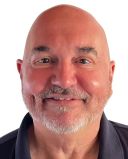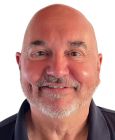Trauma
The Journey From “Why Me?” to “Why Not Me?”
Personal perspective: How an unexpected diagnosis helped me embrace my humanity.
Posted October 24, 2022 Reviewed by Devon Frye
Key points
- We choose how we will tell our personal story, as a story of our own victimhood or as a heroic tale of survival.
- Life’s longest journey is the search for our authentic selves.
- Healing and wholeness means embracing our own humanity in all its strength and vulnerability.
In 2005 I was a very healthy, HIV-negative 47-year-old gay man living in the heart of Washington, DC. I had recently finished a top-to-bottom renovation of my 1924 condo. I had also recently met a man with whom I was talking a lot on the phone, making plans to get together again when I was home in Connecticut during Thanksgiving.
I was thinking about my late best friend Rich Rasi, a psychologist and Catholic priest in Boston, the morning of his October 27 birthday. Rich had died three years earlier from a rare form of kidney cancer for which there was no known treatment. The phone rang.
It was my doctor. He was calling to report back to me the results of blood work he’d done for my annual checkup the week before. This time, though, I could sense a tenseness in his voice.
“I have bad news on the HIV test,” he said. At that point, I had been testing HIV-negative since my first test in 1988. At 47 years old, I had convinced myself that I’d dodged this particular bullet that had killed so many of my friends.
My world was turned upside down in an instant.
By this time, I had been reporting for 20 years on HIV-AIDS as a health/medical writer. I’d written a book about it considered important by people who know the literature of that pandemic. I had borne witness to the terrible suffering of my community and celebrated the stunning heroism and outpouring of love I also witnessed.
But for two decades I had written as an HIV-negative man about people who were living with HIV-AIDS, amazingly courageous people willing to share the most vulnerable and traumatic experience of their own lives with me.
Suddenly, with the snap of the cosmic finger, I had to figure out what, exactly, I wanted my own story to be. What would it be about? Would I wallow in the pain of trauma I had experienced in my life from my boyhood, through the deaths of so many I’d loved, to this latest one? Or would I somehow find a deeper meaning in my experiences—a redemption of my own suffering?
I remembered a conversation with my long-deceased best beau when he told me I probably didn’t belong in Washington because I expect and need authenticity from people. He framed it as something very positive. Now his words took on new meaning for me as I tried to figure out how to be authentic and “real” in telling the story of my own HIV diagnosis and what I would let it mean, and not mean, for me.
I knew immediately I wouldn’t allow my new medical condition to define me. HIV is something I have; it’s not who I am. And, it turns out, who I am has a lot to do with how I choose to tell my story.
I also knew immediately that hiding my diagnosis in a closet of secrecy and shame would contradict the moral sensibility that had driven my HIV-AIDS reporting for all those years. I never accepted that HIV “means” anything more than “we are physical beings and live in a dangerous physical world.” Viruses and other microbes have no intrinsic meaning; they only “mean” what people choose to let them mean. Having HIV, for me, has no more moral significance than if I had the common cold. I “caught” it through sex because, yes, I am a sexual human being.
It took some time, and the help of a good psychiatrist I saw for a few months in my effort to adjust to this totally new version of the John I know. He told me it was an “exciting time” in my life because my diagnosis had upended the chessboard and the future was up to me to decide. It felt anything but exciting at the time.
Within a year after seeing the good doctor, I decided to leave Washington and return “home” to eastern Connecticut. I grew up in the blue-collar, beautiful, and historic eastern corner of the state where I hiked as a boy at Bluff Point on Long Island Sound and graduated from the 166-year-old Norwich Free Academy, whose campus I still think the loveliest of all my alma maters.
I didn’t expect that I would essentially maroon myself on a desert island as far as professional opportunity (and income), but that’s what happened when, despite my highly praised business plan and determination, the realities of the Great Recession forced me to surrender my dream of opening a cool coffeehouse in my old hometown. Experiencing poverty, failing to keep the contract writing work coming in, surrounded by the unhappy old mill town that is my hometown, I reached my lowest-ever point. “Better times are coming, John,” my mom said.
At some point during those hard times, I realized that through it all, I was proud of the man I had made of myself—the inner work I had done that still rejected the “victim” mentality, that let me still feel I could keep going, even have a brighter future.
I also realized how much I had healed inside myself. Living back “home” is what it took to reach a place where I finally understood that “where I’m from” is not anything I should feel ashamed of, that in fact living among “survivors”—people who also sometimes struggle to make a living—is precisely what taught me the resilience and strength I needed to soldier on during some extremely trying times.
I am fond of saying that the longest journey we take in life is the search for our authentic selves, our true home. The place where, after a lifetime of joy, pain, and sorrow, we are able to understand that it’s not a question of “Why me?” We are not singled out by the cosmos for unique suffering; all humans suffer. We also hopefully learn to understand that the real question is “Why not me?” and that the answer is also because I am human.
Coming home to myself—my homecoming—has been about telling my story in all its pain and glory, fully embracing the fact that it all makes up my particular experience of what the late poet Mary Oliver called our “one wild and precious life.”




